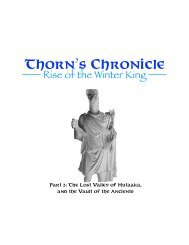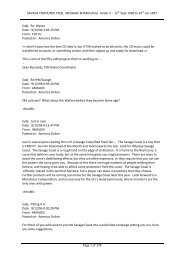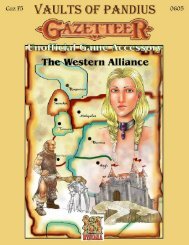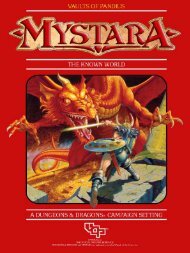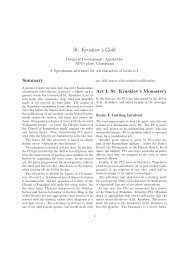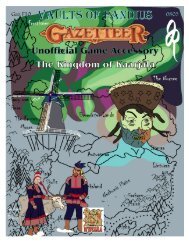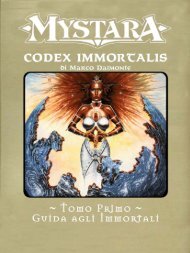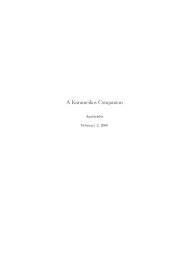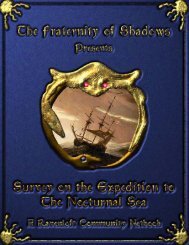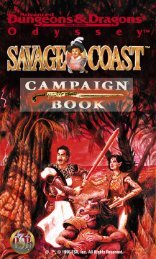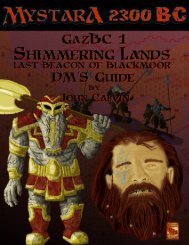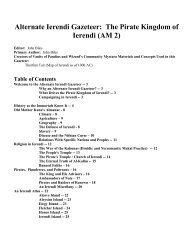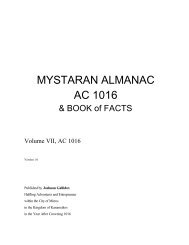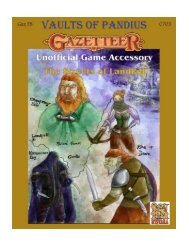The Kingdom of Littonia - Vaults of Pandius
The Kingdom of Littonia - Vaults of Pandius
The Kingdom of Littonia - Vaults of Pandius
Create successful ePaper yourself
Turn your PDF publications into a flip-book with our unique Google optimized e-Paper software.
CREATING LITTONIAN CHARACTERS<br />
50% <strong>of</strong> their starting wealth in goods,<br />
while commoners have 25%. Those <strong>of</strong><br />
gentry station or higher have all <strong>of</strong> their<br />
starting wealth in cash.<br />
Those who are noble or hail from a<br />
noble household receive equipment <strong>of</strong><br />
superior quality (add 10% to the value <strong>of</strong><br />
each item, at the referee’s discretion).<br />
Also at the referee’s discretion, landed<br />
nobles may receive one magic item<br />
(weapons no greater than +1).<br />
Starting Skills<br />
A character’s initial skills are influenced<br />
by their socioeconomic background. A<br />
number <strong>of</strong> suggested starting skills are<br />
provided below. Literacy is not assumed,<br />
and it must be purchased. Characters <strong>of</strong><br />
Known World extraction choose skills<br />
appropriate for their own race and<br />
culture.<br />
Noble: one <strong>of</strong> riding (horse), etiquette,<br />
hunting, or singing (Dainas)<br />
Gentry: one pr<strong>of</strong>essional skill<br />
(accountant, merchant, scribe,<br />
shipwright, etc.)<br />
Urban Commoner: one craft skill<br />
(blacksmithing, candlemaking, carpentry,<br />
leatherworking, pottery, etc.)<br />
Rural Commoner: two <strong>of</strong> cooking,<br />
hunting, labor (farming, fishing, logging,<br />
mining, etc.), nature lore (forest, hills, or<br />
plains), or survival (forest, hills, or<br />
plains)<br />
Fighter: two <strong>of</strong> bravery, foraging,<br />
hunting, nature lore (forest, hills, or<br />
plains), riding (horse), grooming (horse),<br />
or an armor- or weapon-crafting skill<br />
Thief: two <strong>of</strong> appraisal, deception,<br />
detect deception, persuasion, survival<br />
(forest, hills, or plains), or tracking<br />
Cleric: honor (Immortal), history<br />
(<strong>Littonia</strong>n), singing (Dainas)<br />
Druid: area knowledge (<strong>Littonia</strong>),<br />
herbalism, nature lore (forest, hills, or<br />
plains)<br />
Amber Mage: two <strong>of</strong> appraisal, area<br />
knowledge (<strong>Littonia</strong>), herbalism, history<br />
(<strong>Littonia</strong>n), or nature lore (forest, hills, or<br />
plains)<br />
New Skills<br />
Singing (Dainas) (Charisma): A<br />
person with this skill is pr<strong>of</strong>icient in the<br />
art <strong>of</strong> singing <strong>Littonia</strong>n Dainas, a unique<br />
form <strong>of</strong> sung poetry that delivers parables<br />
about life, history, faith, and values.<br />
Several thousand Dainas exist, but an<br />
individual’s repertoire is limited to a<br />
number equal to 100 times the skill score.<br />
<strong>The</strong> margin <strong>of</strong> success (or failure) <strong>of</strong> a<br />
skill check determines the quality <strong>of</strong> the<br />
performance (<strong>of</strong>ten the delivery <strong>of</strong> 20-40<br />
Dainas). Although many Dainas have<br />
religious overtones, they may be<br />
performed as entertainment.<br />
Appreciative commoners may provide<br />
gifts in the form <strong>of</strong> food or goods valued<br />
at one sentīms times the margin <strong>of</strong><br />
success. Nobles will award 1d4 lats<br />
times the margin <strong>of</strong> success.<br />
Performances at court can be particularly<br />
rewarding, with the performer receiving<br />
2d6 lats times the margin <strong>of</strong> success.<br />
Amber Appraisal (Wisdom): With<br />
this skill, the character can accurately<br />
appraise the quality <strong>of</strong> a piece <strong>of</strong> amber.<br />
In financial transactions limited to amber,<br />
both raw material and finished products,<br />
use this skill (see Gaz 9 <strong>The</strong> Minrothad<br />
Guilds and Gaz 11 <strong>The</strong> Republic <strong>of</strong><br />
Darokin).<br />
Amber Crafting (Dexterity): This<br />
is a craft skill specializing in carving,<br />
polishing, and otherwise working with<br />
amber. It is used to produce jewelry and<br />
trinkets. It cannot be employed to<br />
manufacture amber weapons or armor.<br />
One exception to this restriction is that<br />
arrow points and lance or spear tips can<br />
be made out <strong>of</strong> amber.<br />
Amber Economics<br />
Amber, fossilized tree resin, is an<br />
important part <strong>of</strong> the <strong>Littonia</strong>n economy.<br />
Amber is somewhat larger than true gems<br />
<strong>of</strong> comparable standard value. Because<br />
<strong>of</strong> its prevalence, the base value <strong>of</strong><br />
<strong>Littonia</strong>n amber is 80gp on the local<br />
markets. On the foreign market, it is<br />
worth 100 to 115 gp.<br />
5<br />
Other Game Systems<br />
<strong>Littonia</strong> is fully usable as a campaign<br />
setting for game systems other than<br />
OD&D. Guidelines for translation are as<br />
follow.<br />
For First Edition AD&D, all <strong>of</strong> the<br />
standard classes are playable, though the<br />
paladin is exceedingly rare. <strong>The</strong><br />
barbarian class from Unearthed Arcana is<br />
acceptable for people from the fringes <strong>of</strong><br />
the kingdom, but the monk and cavalier<br />
classes, as well as psionics, are generally<br />
incompatible with <strong>Littonia</strong>.<br />
Under Second Edition AD&D, the<br />
following kits are appropriate: barbarian,<br />
outlaw, peasant hero, wilderness warrior<br />
(mainly for Lietuvans), all thief kits (save<br />
buccaneer), all priest kits (save fightingmonk),<br />
peasant wizard, witch, explorer,<br />
giant killer, mountain man, seeker, and<br />
stalker. Giant killer and explorer are<br />
particularly popular kits for rangers who<br />
work the north country. Many local<br />
dwarves are axes for hire, while strong<br />
goblins <strong>of</strong>ten work as sellswords.<br />
Good choices for a specialist wizard are<br />
Enchantment/Charm, Illusionist, and<br />
Alteration. Diviners are uncommon but<br />
not rare. Invokers, Abjurers, and<br />
Necromancers are rare or unknown.<br />
For campaigns under 3.x, the sorcerer<br />
is found within the native population, and<br />
referees who do not wish to adopt the<br />
amber mage are recommended to use this<br />
class in its stead.<br />
Half-orcs and gnomes are unknown in<br />
<strong>Littonia</strong>, regardless <strong>of</strong> edition. Any such<br />
characters would necessarily be <strong>of</strong><br />
foreign import. <strong>The</strong> appropriateness <strong>of</strong><br />
the various prestige and non-standard<br />
base classes are left at the discretion <strong>of</strong><br />
the referee.



